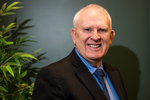

If the new year has you thinking a new strategy for your finances, Bruce Hansen of Edward Jones in Chehalis said regardless of your situation the first recommended step is the same.
Find someone you trust to talk about your finances.
After 14 years as an Edward Jones representative, Hansen said one of the biggest mistakes he sees people make is not having a plan or someone to help you stay on that plan when times get tough.
“Many of them have no idea. They just figure they’re going to work and it’s all going to work out,” Hansen said. “I partner with them the rest of their life to really see the total picture.”
According to the Federal Reserve Bank of New York, American households currently carry about $784 billion in credit card debt and $1.34 trillion in student loans. Add to that mortgages and car loans, and the average U.S. household carries a total of $137,063 in debt, while the U.S. Census Bureau reports that the median household income is just $59,039. But while Americans appear to be living outside their means, Harris Poll reports that only about 32 percent of Americans have a trusted financial planner, about the same number who report having a long-term financial plan in place that they are currently following.
In many cases, people may be embarrassed to talk to someone because they have made financial mistakes such as creating debt, living paycheck to paycheck or taking money out of a retirement account for an unnecessary purchase, Hansen noted. Or they may simply think that a financial adviser is only necessary when you have a lot of financial resources. But helping anyone meet their financial goals is one of the reasons Hansen joined Edward Jones 14 years ago after retiring from a 30-year career as a music teacher, 20 years of which were spent in Centralia. He said an adviser is for anyone regardless of their means and goals, and he always recommends people interview many advisers until they find someone with whom they are comfortable discussing their entire financial picture, warts and all.
“Come in and talk. The biggest thing is for them to see what their picture is and what their goals are,” Hansen said. “Come up with a plan and follow it and their advice to keep yourself out of pitfalls later.”
Most people stall out on a financial plan because they don’t know where to start, Hansen noted. Should you pay down debt first? Should you start a savings account first? Or is investing your money the best first step?
Hansen said it all depends on the individual and their personal financial goals, which is why an adviser is so important. In general, though, he noted that if someone wants to make a positive first step toward financial security, a good place to start is to establish an emergency fund, a fund of money that is not easy to access and is for use only in emergencies.
“That way the person can be proactive about their finances instead of reactive,” Hansen said.
No matter the individual path someone takes to financial security, Hansen said there are many financial traits those who are successful share. First is having a family budget and sticking to it. Identifying places where you can tighten your financial belt can free up money to be used for more important expenses such as saving for the future or paying off debt.
“Learn to know what is needed and what is wanted,” Hansen said.
Paying off debt with the goal of eliminating it is another common trait of financially successful households. Hansen said there are many routes to paying off debt and they all begin with honestly looking at your amount of debt and coming up with a plan to tackle it. The plan Hansen espouses is called snowballing, taking your smallest debt and paying it off and then rolling the money you were spending on that debt into the payment for the next smallest debt, and so on until all debt is eliminated.
“Eventually you can pay it all off because debt can control you,” Hansen said.
Another financially healthy strategy is to utilize the tools available to you to save for the future. If your work offers a retirement plan, take advantage of this easy way to accumulate money by contributing at least the amount your company will match.
Financially healthy households also do not allow emotions to get in the way of their financial goals. For example, taking money out of your retirement account to buy a boat might seem like a great idea, but the hit you take financially is not worth it. Investing is another area where people let their emotions get them into trouble. For instance, Hansen said after the most recent presidential election, many people were concerned about what the stock market would do. Hansen said this is an area where having a trusted financial adviser can help because during downturns they can help you understand the moves that would be best.
“The more you know the less fear you’ll have,” Hansen said. “When I have to earn my keep is on a downturn. People get scared, and yet that’s when we put more money in.”
And it’s never too early to find someone with whom to talk financial goals. Hansen said he has many people come to him later in life when they are beginning to think about retirement. Certainly, there are things that can be done then, but starting earlier is a better strategy. Hansen noted a 20-year-old who saves $125 a month for 45 years will save about $69,000. If put into a compounding mutual fund, that money will earn them $1-$2 million.
“The older you get the more expensive it is to retire,” Hansen said. “The younger you start, the cheaper it is to accumulate wealth.”